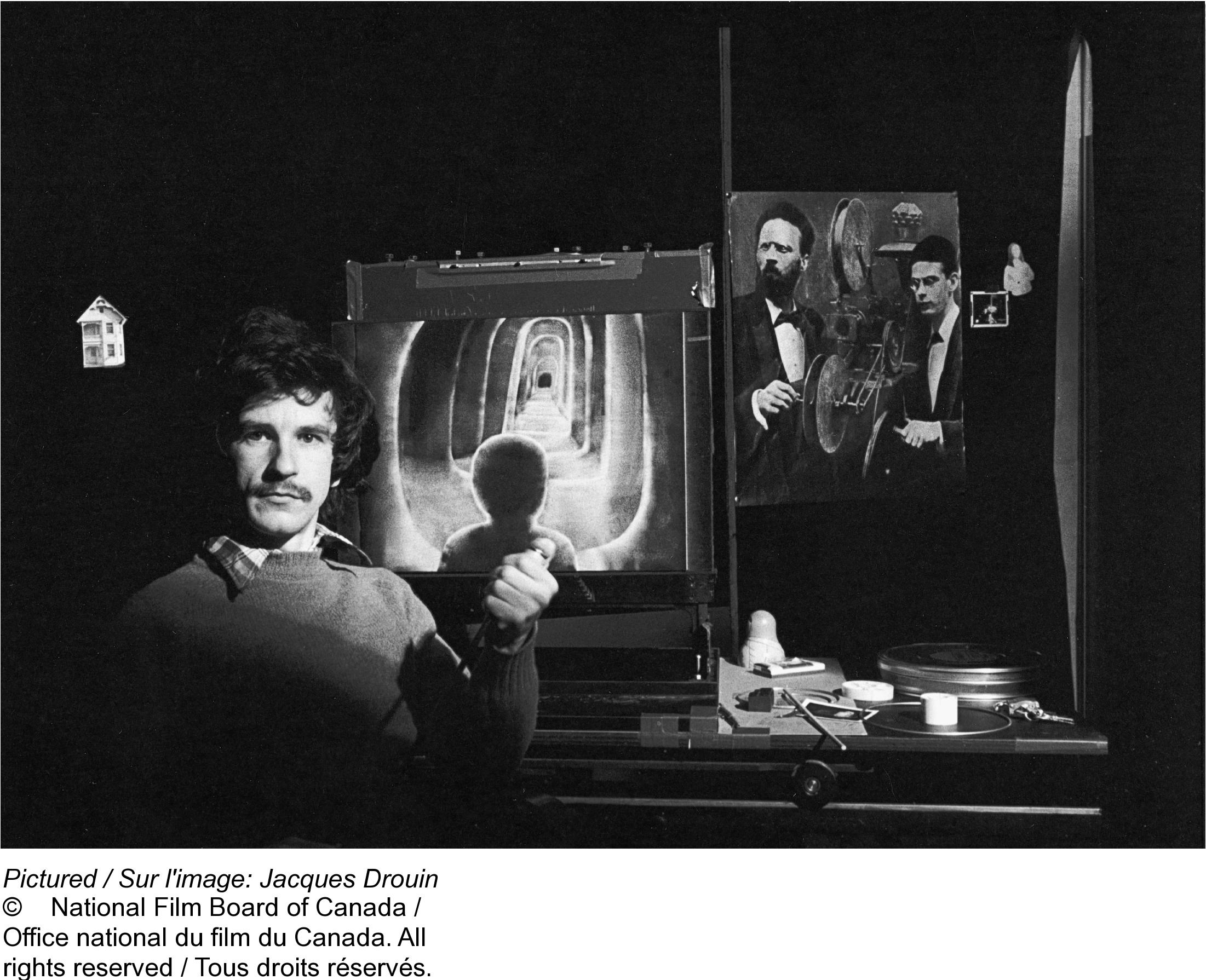
August 30, 2021 – Montreal – National Film Board of Canada (NFB)
The National Film Board of Canada is grieved to learn of the death of filmmaker Jacques Drouin, an outstanding animator and skilled picture editor. Over the course of his 30-plus years with the NFB, he created six unique and poetic films, including the now classic Mindscape (1976). Drouin’s work is inextricably linked to the Alexeieff–Parker pinscreen, a legendary tool in the history of animated film.
Quotes
“Jacques Drouin was a major figure at the NFB, with an extraordinary career path: For three decades, he was the only animator in the world using the pinscreen technique. An outstanding filmmaker, he was also unfailingly generous, forever ready to share his knowledge with young filmmakers and his colleagues. Not only did he create unforgettable works, but he also ensured that work could continue to be created using the pinscreen—another of his generous legacies,” said Claude Joli-Coeur, Government Film Commissioner and NFB Chairperson.
“The international animation community today lost a great spirit. Jacques Drouin, engaged and passionate, gave himself over fully to his art by tirelessly championing that rarest of animation techniques, the pinscreen. Throughout his career, he carried the legacy of this imposing apparatus of film heritage. But Drouin also stood out for his exemplary involvement in the day-to-day activities of the NFB and with the broader animation family on the world film scene. For all his extraordinary talent, he remained humble. He was endlessly erudite, a patient and attentive teacher, and a warm and caring colleague. But above all, a man of exceptional humanity,” said Julie Roy, the NFB’s Director General of Creation and Innovation.
The pinscreen
Drouin made his films—from Three Exercises on Alexeieff’s Pinscreen (1974) to Imprints (2004)—on the “new” NEC (nouvel écran d’épingles) pinscreen, an ingenious device consisting of 240,000 pins, each inserted in its own hole through a vinyl screen held in a rigid frame. Acquired by the NFB in 1972, it was for decades the world’s only working pinscreen. Drouin later initiated filmmaker Michèle Lemieux into the technique, which she subsequently applied to Here and the Great Elsewhere (2012) and her current work-in-progress, Le Tableau. A room at the NFB’s new Montreal headquarters in the Balmoral building is named Mindscape (Le paysagiste) in honour of Drouin.
Drouin’s career
- Jacques Drouin was born in Mont-Joli, Quebec, in 1943. After studies at the École des beaux-arts de Montréal and UCLA, he began working as a TV editor in 1971. Two years later, during an internship at the NFB, he made his first professional film, Three Exercises on Alexeieff’s Pinscreen (1974).
- His next short film, Mindscape (1976), confirmed his talent. The film garnered 17 awards and earned praise from Norman McLaren and Alexeieff himself.
- In the years that followed, Drouin worked primarily as a picture editor, including on such award-winning titles as Co Hoedeman’s The Sand Castle (1977 Oscar for best animated short) and Clorinda Warny’s posthumous film Beginnings (1981, Special Jury Prize at Annecy).
- Co-directed with Czech animator Bretislav Pojar, Night-angel (1986) was an ambitious film combining pinscreen and puppet animation, with colour ingeniously added through the use of coloured lighting. The film took nine awards, including the Grand Prix at the Odense International Film Festival in Denmark.
- Drouin then made a number of short films on commission, as well as animated sequences for NFB documentaries, while continuing his work as an editor. He returned to directing in 1994 with Ex-Child, created as part of the Rights from the Heart collection promoting children’s rights. The film picked up six awards.
- In 2001, he made A Hunting Lesson, adapted from a tale by Jacques Godbout. This was Drouin’s first experience with a complex plot, obliging him to devise many original solutions to overcome the limits of the pinscreen. The film received four awards, including the Special Jury Award at the WorldFest in Houston.
- Having come up with the ideas of varying the distance between camera and pinscreen and flipping the screen, Drouin proceeded to systematically apply these discoveries to Imprints (2004), an experimental work in which he revolutionized the images able to be produced using a pinscreen.
- Drouin subsequently retired from the NFB to pursue independent research and filmmaking.
- In 2007, he restored the three main Alexeieff–Parker pinscreens for France’s film archives, thus perpetuating the technique that had been passed down to him by the tool’s inventor. In 2012, the only other working pinscreen in the world was acquired by French government agency Le Centre national du cinéma et de l’image animée, with a view to letting European artists try their hand at the extraordinary instrument. Dubbed the Épinette, the device was successively restored by Drouin and Lemieux, constituting an invaluable legacy to the world animation community.
- In 2009, the NFB released the DVD box set Jacques Drouin – Complete Pinscreen Works.
- A channel dedicated to Drouin featuring some of his works and documentary portraits can be accessed on NFB.ca.
– 30 –
French version here | Version française ici.